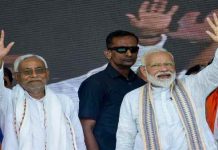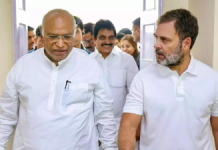
The patidars, a dominant community in Gujarat finally had their way when Rupani was replaced by Bhupender Patel. In Punjab, the Congress too factored in caste equation while zeroing in on Channi.
It is one state after another: if BJP went ahead and showed Gujarat Chief Minister Vijay Rupani the door, its bete noire Congress shook up Punjab. Each, of course, had their reasons. The common factor, however, were the forthcoming elections due next year. None of the parties can go to the electorate either as a divided house as was the case in Punjab or under a Chief Minister who was an enigma to the dominant caste, as in Gujarat.
With anti-incumbency staring at its face after a 27-year rule in Gujarat, the BJP was caught in a caste cauldron: the patidars, a dominant community, in Gujarat finally had their way. The BJP succumbed and the community won.
To say that the patidar community is among BJP’s core vote bank is stating the obvious. Equally, its drift in the past few years is well known. Their grouse that a non-Patel was Chief Minister was something the BJP could no longer ignore.
Consequently, Rupani was shown the door only to be replaced by Bhupender Patel: a magic surname so to say. The Patels, it is well known, wield immense political influence to swing the electoral outcome one way or the other.
Taking the literal meaning, patidars are holders of strips of land for cultivation. Of the various sub-castes, Leuva and Kadva are prominent: both claiming to be descendants of Lord Ram’s sons Luv and Kush, respectively. In later years, the patidars assumed the surname Patel: the albatross around BJP’s neck, till of course the change happened.
The outgoing Chief Minister Rupani, a non-patidar, belongs to the Jain community. Apart from his caste being his cross, Rupani was in the eye of a storm for his non-performance and mishandling of the pandemic.
However, to attribute the leadership change to governance-failure is oversimplifying the issue. The real reason is appeasement of a single community that has electoral ramifications, namely the Patels.
Gujarat is among the half a dozen states due for elections next year but its importance can be gauged by the fact that it is the home state of Prime Minister Narendra Modi. Therefore, any loss of face would be an affront to his leadership. It would also put a big question-mark on Brand Modi’s viability and relevance.
Therefore, the challenge is not about the BJP winning Gujarat. It is about bagging big numbers akin to Modi’s larger than life stature. Any setback could prove detrimental and upset BJP’s calculations for the 2024 general elections.
By replacing Rupani with Bhupender Patel the BJP hopes to contain the governance deficit as well as balance the caste equations.
Whether it ultimately will, remains to be seen because apart from anti-incumbency, Rupani’s track record as Chief Minister is neither flattering nor laudatory. It is no secret that Delhi remote controlled Gujarat. It is therefore not without reason that he was dismissed as a “glorified clerk” who never came out on his own.
A patidar face, Bhupendra Patel is the fifth Gujarat CM from that community. If Modi started off by selling chai, Patel sold fire-crackers in Ahmedabad’s walled city. Add to that the fact that he is not seen as particularly ambitious. This, in the BJP’s scheme of things, is a plus point given that ambition is the hallmark of the Big Boys, namely Prime Minister Narendra Modi and Union Minister Amit Shah.

Cong kills two birds with a stone
Cross over to Punjab and a bigger picture is playing out. Here too, the caste factor was at play but, unlike Gujarat, that was not the determining factor for the leadership change. Here it was a bitter feud that threatened to cast its shadow on the forthcoming polls. Punjab, like Gujarat, is due to go to elections next year.
Unlike the BJP where there was not even a whimper when one was ousted and the other let in, in the Congress the fight was out in the open. It was in 2017 that Singh was elevated as Chief Minister after the Congress won a triangular contest facing the Aam Aadmi Party and Shiromani Akali Dal-BJP combine.
When Sidhu quit the BJP to join the Congress, few could have guessed that he would emerge as the main challenger to Singh.
Even when he was inducted as a minister in Singh’s Cabinet, he was a law unto himself chartering a course sometimes contrary to norm. A case in point is when Sidhu insisted on continuing with his television shows after his induction as minister on grounds: “What I do after 6 pm is no one’s business”.
Sidhu, it may be recalled, is a well-known commentator and a regular on a comedy show for some years. Things also took an ugly turn when Sidhu went to Pakistan to attend Prime Minister-elect, Imran Khan’s swearing-in ceremony.
Cut to the present when Singh gave in, though reluctantly, to Sidhu being named state Congress Chief. Publicly, they called it a truce. Clearly that was optics. In an enough is enough stance, the Congress veteran recently resigned as Chief Minister citing “humiliation” as a ground.
Continuing his stint in his parent Party, Singh however has made it clear that he will fight tooth and nail to oppose Sidhu’s elevation as Chief Minister. The way the battle has panned out, the forthcoming Assembly election will see the two from the same Party fighting each other, unless of course Singh quits the Congress.
As of now, attention is on the new incumbent: a dark horse who was not among the front runners. Therefore when Charanjit Channi was handpicked to succeed Singh, it was a bit of a surprise.
A three-time legislator, the 58-year-old is a late entrant into the Congress, joining it less than a decade ago. Channi rose from the ranks, first contesting the municipal council and later as an Independent from Chamkaur Sahib Assembly constituency. The three-time legislator retained the seat successively in 2012 and 2017 as a Congress candidate.
As a minister in Amarinder Singh’s Cabinet, Channi raised a banner of revolt on Singh’s failure to honour the promises made to the voters in Punjab. That apart he was clearly part of Sidhu’s camp. None of this, however, would have influenced the Congress High Command’s decision to handpick Channi as Punjab’s Chief Minister.
Like the BJP did in Gujarat, the Congress too had its eyes on the caste factor while zeroing in on Channi. He is the state’s first SC Chief Minister and also one who wears a turban. The decision of a non-Sikh heading the state as Chief Minister was indeed a bold one given that even senior leadership in the Congress was somewhat apprehensive at the prospect.
It was none other than Ambika Soni, Member of Parliament from Punjab, who publicly stated that only a Sikh can be Punjab’s Chief Minister. That this drew flak from the non-Sikhs is another matter.
Scheduled Castes constitute a substantial part of the population in Punjab: around 32 percent. Of this, one-third are SC Sikhs as per the last count. If statistics are anything to go by, in as many as 54 Assembly constituencies SCs constitute more than 30% of the total voters and between 20-30 percent in another 45 Assembly constituencies.
Their electoral significance is evident from the fact that political parties are bending over backwards to woo them. If the Shiromani Akali Dal has joined hands with the BSP and announced that the deputy chief minister post will be given to a Scheduled Caste if it wins the assembly polls, the Aam Aadmi Party too has made it known that SCs will get their due share in power, if it is voted in.
With Channi at the helm, the Congress can, if it plans its election strategy well, cash into the Dalit vote bank. Add to this the fact that Congress has in the past been a beneficiary of SC Hindu votes in Punjab. Channi’s elevation can further amplify this gain.
Set against this backdrop, Amrinder Singh’s resignation was perhaps god-sent. Not only did it end the ugly spat but it did present an opportunity to the Congress to do its caste mathematics and arrive at a winning formula. It is therefore not without reason that Opposition parties are smarting under the Congress gest. Some have gone as far as terming it as its coup de maitre or master-stroke as it were. Whether it is one, only time and election results will decide.
Yet what one cannot take away from the Congress is its big-picture vision in handpicking Channi. This time around it was looking beyond the state and hoping to reap the SC benefit in the other states going to polls next year; this time the Party did not simply pick up a Chief Minister to resolve a state-specific crisis. It did much more: it sent out a strong political message to the SCs as a community that the Party stands with them and is sensitive to its aspirations. Quite unlike the BJP where when it propped up a Patel Chief Minister it was with a myopic vision of reaping benefits limited to Modi’s home state alone.
Therefore Channi may well do the bhangra as he did with college students, flip a coin to decide transfers of teachers when he was minister or ride an elephant like he had on an astrologer’s advice, the Congress can sit smug because Channi’s caste credentials could help it retain power in a state that had begun to slip away.
tehelkaletters@gmail.com













